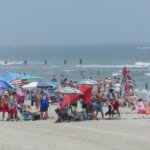CAPE MAY — Some of the county’s oldest residents could be in trouble if the Delaware River dredging project moves forward as it appears it will.
Horseshoe crabs have been around for 250 million years and the Delaware Bay region is home to many of the prehistoric creatures.
Their habitat here, however, could become compromised by the project since dredging spoils could smother recently spawned horseshoe crabs on the beaches.
According to the Delaware Riverkeeper Network, an environmental organization, it has been about 17 years since the proposal to deepen 100-mile channel from 40 to 45 feet was first introduced, and nearly 18 months since it was most recently tabled when Gov. Jon Corzine withdrew this state’s support of the project.
The project, which would be supervised by the U.S. Army Corps of Engineers, was stalled for several reasons, including its effects on the horseshoe crab and other wildlife, economic feasibility of the project and environmental pollution concerns relating to dredge spoils, but now it appears to be restarted.
Since November 2005, Pennsylvania Gov. Ed Rendell has refused to allow his state’s seven commissioners of the Delaware River Port Authority (DRPA) to attend meetings, ef-fectively halting the business of the bi-state authority, which owns and operates four bridges, a commuter train line, a ferry and a cruise terminal.
This delay in meeting cost the authority approximately $11 million, according to Corzine’s office.
Around this time last year, New Jersey Rep. Robert Andrews (D-1st), a longtime opponent of the project, described how he had asked Rendell to stop his efforts to force the continua-tion of the project.
“Our port’s economy is growing at a record pace and there is no need to waste $300 mil-lion in taxpayer dollars to deepen the Delaware River five feet,” he insisted. “We need to invest in increased security and improved infrastructure rather than destroy our environ-ment and deplete our bank accounts.”
In October 2006, U.S. Rep. Frank A. LoBiondo (R-2nd) joined Andrews in writing a letter to Rendell.
“Your decision to shut down the DRPA is unnecessarily harming citizens on both sides of the river,” they suggested in the letter.
On March 13 this year, Andrews featured an article on his Web site describing Rendell’s move as “an attempt to force New Jersey’s members on the authority to relent and approve the dredging project.”
If so, it apparently worked.
The DRPA met for the first time since then on May 17 in Camden to discuss a proposal that would take financial responsibility from New Jersey and place it entirely in Pennsylva-nia’s hands.
According to the agreement, the commonwealth would also accept legal liability for the project, take the dredge spoils and agree to expand the authority’s train line.
The $300-million project would move from DRPA’s control into another authority’s care.
The Philadelphia Regional Port Authority (PRPA), a Pennsylvania agency, would become the local sponsor and essentially remove New Jersey from the project, but the state would retain its rights to review and deny permit applications associated with the dredging, Corzine said.
Additionally, the $19 million New Jersey set aside to fund the dredging project, the gov-ernor pointed out, will be used for state environmental and port infrastructure improve-ments.
“My position on dredging itself has not changed,” Corzine said after the meeting. “I still have serious environmental and economic concerns about the wisdom and propriety of dredging.”
Rendell also addressed the possible impacts in his statement.
“I believe nothing is more important to the future of the ports of Philadelphia, southern New Jersey and Delaware than this project,” he said. “But, I will work to ensure that this work is undertaken in a manner that is as minimally disruptive to the environment as pos-sible.”
In order to address these concerns, the Army Corps of Engineers will be asked to do a new environmental impact study within the next six months.
Part of that study is sure to deal with the project’s possible negative impacts on this county’s most elderly population – the horseshoe crabs. Environmental groups are hoping they will continue to call this their home for another 250 million years.
Contact Hart at (609) 886-8600 Ext 35 or at: jhart@cmcherald.com






